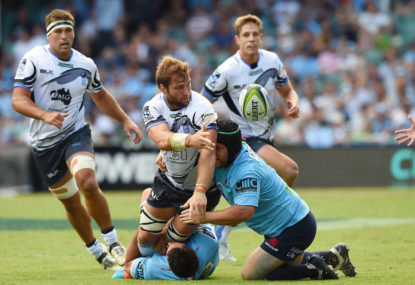Richard Haynes
new author
Roar Rookie

And so here we are again, moping on the couch on a Saturday night after watching our Wallabies get trounced in yet another Blendisloe Cup match.
More of the wash-up from Bledisloe 1
» Match Report: NZ smash Australia
» LORD: The Wallabies can’t pass, catch or tackle
» Five talking points
» What changes should the Wallabies make?
» DIY Player Ratings
» WATCH: All the highlights
I so wanted to believe the optimists who were calling a Wallaby win.
We’d performed so well in the World Cup, we’re hard to beat in Sydney, the All Blacks have lost some 700 plus Tests worth of experience, have a new captain, and so on. All valid points but there were some other brutal realities that I couldn’t block out.
The most pressing of these was the Australian verse New Zealand Super Rugby record in 2016.
And that stat got me thinking. And watching. What were the Kiwis doing to be so dominant? I actually think it’s staring us right in the face: They off load during the tackle.
The All Blacks are masters. They pride themselves on it. In fact, I would hazard to guess, if you’re playing rugby in New Zealand, no matter how good the rest of your game is, if you’re not able to offload you’re not going to get a sniff of top level rugby.
The New Zealand offload prowess was demonstrated in all it’s glory in the first Bledisloe. And it was made all the more obvious in comparison to the Wallabies who were extremely content hitting the line with their heads down and making a few hard yards.
Commentator Matt Burke hinted at the offload factor when he talked about the Kiwis making the 50:50 passes stick, but I’m not sure why it wasn’t the number one topic of conversation.
Here’s why it should have been. Let me start with some history first.
Australia won the 1991 World Cup on the back of running rugby. Fast ruck ball, catching your opposition on the back foot after multiple phases and the holes or overlap will appear. Running rugby was a step change, the Southern Hemisphere embraced it and dominated winning seven of eight World Cups to date.
The offload is the natural evolution of running rugby which has now, in my (rookie) opinion, reached the point where it is another step change. It’s nearly impossible to defend, the defensive line approaches meets the attackers, stops and is all of a sudden chasing the receiver of an offload from the tackled player.
It’s like a mini-phase where the attackers give the defenders literally zero time to regroup.
The New Zealanders themselves do actually do a reasonable job of defending the offload and it’s because they get a hell of a lot of practice. Watch New Zealand derby Super Rugby 2016 games and you’ll see what I mean.
What we’re seeing in New Zealand rugby today is a whole generation of players who have grown up being coached to throw what Matt Burke refers to as the 50:50 passes. And as he rightly said, they’re not 50:50 any more, they’re 80:20 (or in the case of the All Blacks, and even most of the New Zealand Super Rugby teams, probably better).
Contrast that with the current crop of Australian players who’ve grown up being taught not to throw the 50:50 pass. Australian players are all familiar with the coaching slogans:
“Take the hit and go to ground”;
“Don’t force the pass”;
“Don’t shovel s*!t”;
This is one big problem to correct. You learn the offload in a season. It’s five or ten seasons worth of practice, maybe more, before you turn those 50:50 balls into far higher percentages. And if you’re already on the “don’t throw 50:50s” path it’ll take longer.
Embracing and perfecting the offload is going to take a massive commitment from every coach involved in Australian rugby from the under sixes through to the Wallabies to start embracing the offload.
Hard to pull off, as it’s not something that yields dividends quickly, it will require an unselfish, “do it for Australia, it’s better in the long run” type attitude. That’s the only way I see out of it.